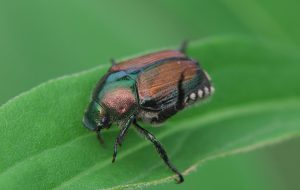Among the most destructive pests in yards and gardens is the Japanese beetle, a relative newcomer to Taylor County. Alt hough they have been creating problems in more southern parts of the state for some time, they have not been a serious problem here until the last few years, when we have had a few landowners contact us about them.
hough they have been creating problems in more southern parts of the state for some time, they have not been a serious problem here until the last few years, when we have had a few landowners contact us about them.
The adult beetles are a pest on many plants, feeding on both foliage,flowers, and fruit. Among the 350 species of plants they are known to eat are birch, crabapple, rose, mountain ash, cherry, and lindens. They also eat fruits, vegetable, crops, and weeds. The grubs feed below ground, chewing on the roots of turf grass and other plants. The root damage prevents uptake of water, and the affected grass or other plants dry up. In lawns, large areas of dry grass can develop, and the grass can actually be rolled up like a carpet. The white grubs, which start out small but grow to about 1 1/2 Inches in length, can often be seen under the grass and in the top 4-6″ of soil. The grubs of the May beetle/June bug are similar, and it is important to identify which one you have as control is different for the two species.
Picking the adults off plants and dropping them in soapy water is one way to control them if the infestation isn’t too large, and you look for them regularly. Other controls are also available, including for the grubs. Japanese beetle traps are not advised; while they may trap adult beetles, they are likely to attract even more beetles to your plants.
For more information on identification and control, see this publication from the UW Insect Diagnostic Lab and other publications from the University of Wisconsin: Garden Facts A3737 E Japanese Beetles or Wisconsin Horticulture Publication 1062. All these publications have similar information but some differences. For information about the grubs and how to differentiate between Japanese beetle and May beetle grubs, see A3275 Turfgrass disorder: White grubs.




